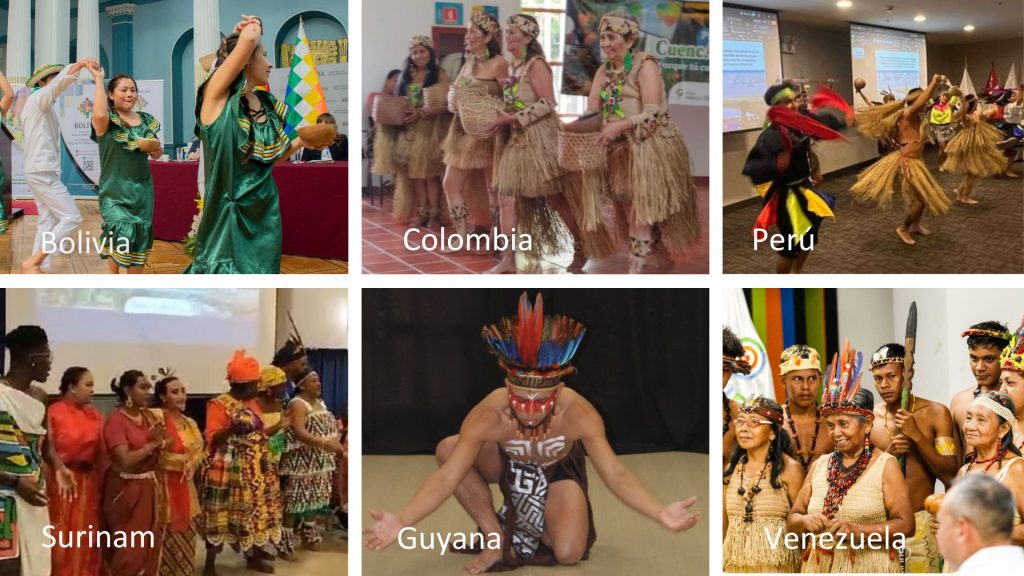Details
Dates
Organizers
Local
In the context of the Amazon Basin Project, Bolivia, Colombia, Guyana, Peru, Suriname, and Venezuela held National Workshops for the implementation of the Strategic Action Program – SAP, marking the dynamics of the second semester of 2023. The SAP is a Regional Strategy endorsed in 2017 by the eight member countries of the Amazon Cooperation Treaty Organization – ACTO to ensure the integrated and sustainable management of transboundary water resources in the Amazon Basin.
The six countries convened representatives from the national, departmental, and local governments, experts, indigenous authorities, and civil society in their National Workshops to promote strategic actions aimed at strengthening the capacity for Integrated Water Resources Management (IWRM) at the national and regional levels, as well as enhancing the resilience of local Amazonian communities to the challenges of climate change.
In the realm of regional cooperation, the National Workshops were held to identify challenges and opportunities for Amazonian cooperation in IWRM and indicate ways to ensure the availability of coherent information across the Amazon Basin to support decision-making.
The cycle of National Workshops opened in August with Bolivia, in the capital La Paz. In September, Colombia and Peru held their workshops in the cities of Leticia and Lima, respectively. Suriname and Guyana organized theirs in early October, gathering participants in the capitals Paramaribo and Georgetown. In November, Caracas was the chosen city to host Venezuela’s National Workshop. Brazil and Ecuador will hold their National Workshops in early 2024.
Program and Working Methodology
Organized by the national governments of the six countries with the support of the ACTO Permanent Secretariat, the National Workshops followed a methodology and working dynamics aimed at identifying technical, institutional, and cultural advances and challenges for the implementation of the SAP.
Over two days, the 310 participants in the events worked in thematic groups to address the technical and cultural dimensions of water management in the Amazon and define recommendations for the formulation of a National Action Plan – NAP.
The NAP will be a document aligned with national policies and will encompass various actions within the framework of SAP implementation. These include institutional strengthening for IWRM, a Training Program in IWRM, water resources monitoring, as well as a focus on cultural aspects related to water and climate change adaptation measures in the Amazon Basin.
Given that gender equality represents a cross-cutting element in all SAP and NAP actions, the National Workshops provided their audience with Gender Equity/Equality Training to increase and make more effective women’s participation in water management in the Amazon Region.
Thematic groups were accompanied by experts and members of the responsible governmental bodies, who collaborated and provided guidelines to ensure the success of the work. At the end of the National Workshops, the results obtained by the thematic groups and the gender training group were shared with all participants.
Technical IWRM Group
The groups addressing technical aspects of IWRM in the National Workshops cataloged national advances in SAP implementation. Regarding IWRM strengthening, for example, the Bolivian group highlighted the inclusion of the transboundary basin approach in the update of the National Water Resources Policy. In turn, participants in the Peru workshop indicated the role of creating Basin Water Resources Councils for participatory water management, while in Suriname, the group noted the start of a study on water pollution issues related to gold mining.
Evaluating aspects of the SAP that still need to be developed at the national and regional levels, workshop participants identified as priorities monitoring and data exchange among countries, the development of a regional emergency plan, especially for flood and drought risks, and the revitalization of established agreements, among others.
The groups also mentioned training needs in methodologies to optimize IWRM, remote sensor calibration, real-time monitoring technologies, international law principles on shared waters, procedures for water quality monitoring, among others. The importance of rescuing knowledge about traditional and local water management practices was also mentioned.
Cultural Group
To demonstrate the importance of the cultural dimension in SAP implementation, the National Workshops opened with artistic presentations that highlighted the cultural richness and diversity of each country in the Amazon context. Subsequently, cultural groups worked to identify the main cultural, artistic, and educational institutions and organizations in the Amazon context, with the aim of forming a regional support network for the SAP.
The groups also contributed to a cultural, artistic, and educational agenda committed to the effective inclusion of indigenous peoples, the revaluation and visibility of local knowledge, the exchange of experiences, and interdisciplinary dialogue.

Gender Training
To promote the transversal inclusion of gender issues in SAP implementation, the National Workshops held an awareness-raising conference for all participants, followed by training for 86 people to develop capacities in planning and implementing policies, plans, programs, and projects.
The training provided participants with theoretical and practical methodologies and tools aimed at incorporating a gender perspective with the necessary transversality. The central tool – the Gender Mainstreaming Scanner, developed by ECLAC and the German Agency for International Cooperation (GIZ) in 2021 – can be tactically applied in the different phases of plans, programs, and projects.
The skills acquired in the training will allow IWRM professionals to work to promote and establish gender equity, contributing to men and women having equal access to and control over natural resources, substantive women’s participation in natural resource governance, and equitable distribution of socio-economic benefits.

